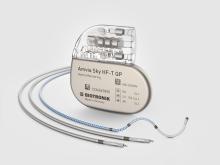First Real-World Data on the Utility of Device-derived Daily Activity, a Novel Digital Biomarker, to Predict Ventricular Arrhythmias Data from the CERTITUDE Registry Presented at ESC 2021
LAKE OSWEGO, Oregon—Following the European Society of Cardiology (ESC) Congress 2021, BIOTRONIK today announced the first observational results of the CERTITUDE registry. The registry is designed to evaluate real-world clinical outcomes of patients in the United States who use implantable loop recorders (ILR), pacemakers, implantable cardioverter-defibrillator (ICD), and cardiac resynchronization therapy (CRT-D) devices that have BIOTRONIK Home Monitoring® capability. BIOTRONIK Home Monitoring is the only monitoring system approved by the FDA for early detection and as a replacement for device interrogation during in-office follow-ups.
While prior studies have shown an association between activity and outcomes, no studies had examined the temporal relationship between device-derived daily activity, a novel digital biomarker, and ventricular tachyarrhythmias (VT). The authors found a temporal decline in device-derived activity following ventricular arrhythmias treated with a shock, but not in patients treated with anti-tachycardia pacing (ATP). Monitoring device-derived activity post-VT events with a shock could provide relevant clinical information and potentially warrant intensified treatment.
“The CERTITUDE registry represents a robust post-market database consisting of over 55,000 active patients monitored by the BIOTRONIK Home Monitoring® system. Our data analysis aimed to identify whether changes in activity predict VT, or conversely VT predict changes in activity,” said Valentina Kutyifa, M.D., Associate Professor of Medicine at the University of Rochester Medical Center, Rochester, NY, who presented the data virtually at the ESC Congress 2021.“Between scheduled in-clinic appointments, this technology transmits remotely and leverages important clinically actionable data to improve physician comprehension of device therapy, results, and disease progression in a real-world context.”
This real-world observational study from ICD and CRT-D devices collected de-identified daily data on leads, arrhythmias, and vital signs such as activity within the normal course of medical care. Activity data was provided for 16,475 devices (9,732 ICDs, 6,743 CRT-Ds). The total period of follow-up was 18,355 years (5.6 million days with transmission). A total of 1,409 of the 2,636 VT episodes studied had a rate of >200 beats per minute (bpm), and 593 were treated with shock. Patients with VT episodes of >200 bpm who were given shock treatment showed a substantial decrease in activity after the VT event, with a median of -8.7% (IQR -24.6 percent; 7.3 percent, p<0.001). However, there was no decrease in activity until the VT exceeded 200 bpm (p=0.690). VT episodes with a heart rate of more than 200 bpm treated with ATP alone were not associated with a reduction in activity before or after the episode.
The patient activity was measured with an accelerometer and was reported daily as a percentage active during the day. The initial event per device and 7-day activity windows were used to determine temporal changes in device-derived activity associated with treated VT. The baseline period was set at 31-38 days before the VT. Heart rate (≤200 bpm,>200 bpm) and therapy were used to classify VT occurrences (shock with or without ATP, ATP alone).
"The painless anti-tachycardia pacing feature options in BIOTRONIK devices ensure optimal delivery to treat potentially life-threatening arrhythmias, avoiding unnecessary shocks," said David Hayes, M.D., Chief Medical Officer, BIOTRONIK, Inc. “Our commitment to support a robust large-scale registry, such as CERTITUDE, is the type of clinical rigor that physicians have come to rely on and will propel us into the future in improving patients’ quality of life”.
BIOTRONIK engaged the following steering committee members:
- Valentina Kutyifa, M.D., Associate Professor of Medicine, University of Rochester Medical Center, NY
- Jagmeet Singh, M.D., Ph.D., Professor of Medicine at the Harvard Medical Center, MA
- Jonathan Piccini, MHS, FACC, FAHA, FHRS, clinical cardiac electrophysiologist and Associate Professor of Medicine, Duke University, NC
- Larry Chinitz, M.D., Director of the Heart Rhythm Center, Cardiac Electrophysiology, NYU Langone Medical Center, NY
- Niraj Varma, M.D., Ph.D., FRC, Cleveland Clinic, OH
- Mintu Turakhia, M.D. M.A.S, Associate Professor of Medicine, Stanford Center for Digital Health, CA
Boilerplate
At BIOTRONIK, patient well-being is our top priority and has been for 60 years. BIOTRONIK is a leading global medical technology company with products and services that save and improve the lives of millions suffering from heart and blood vessel diseases as well as chronic pain. Driven by a purpose to perfectly match technology with the human body, we are dedicated innovators who develop trusted cardiovascular, endovascular and neuromodulation solutions. BIOTRONIK is headquartered in Berlin, Germany, and is represented in over 100 countries.

